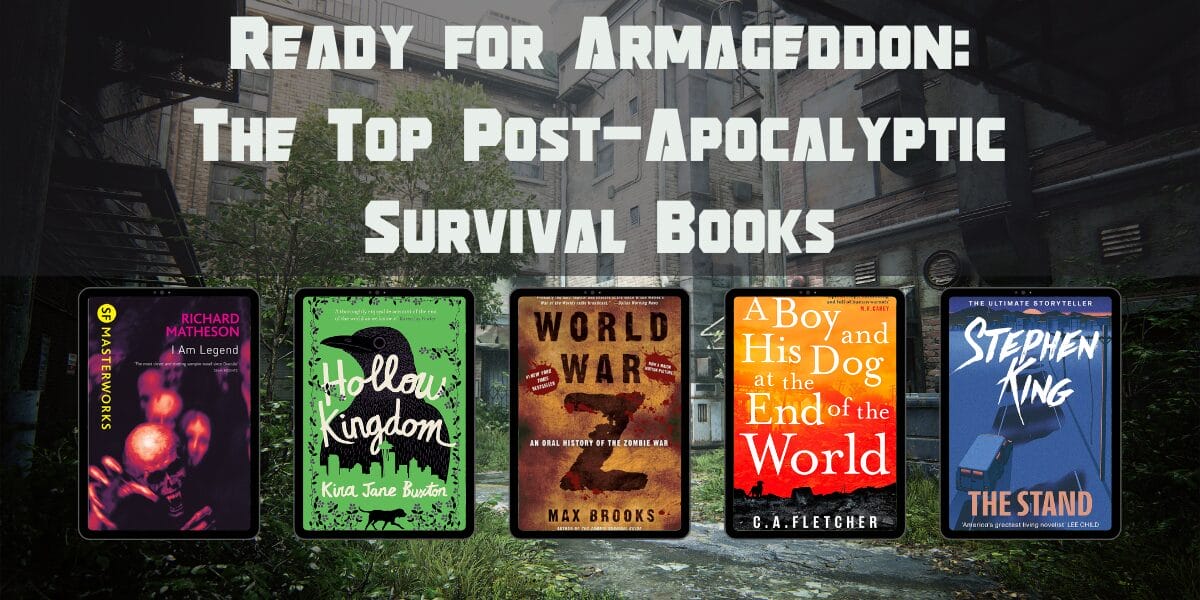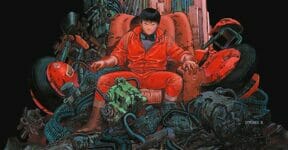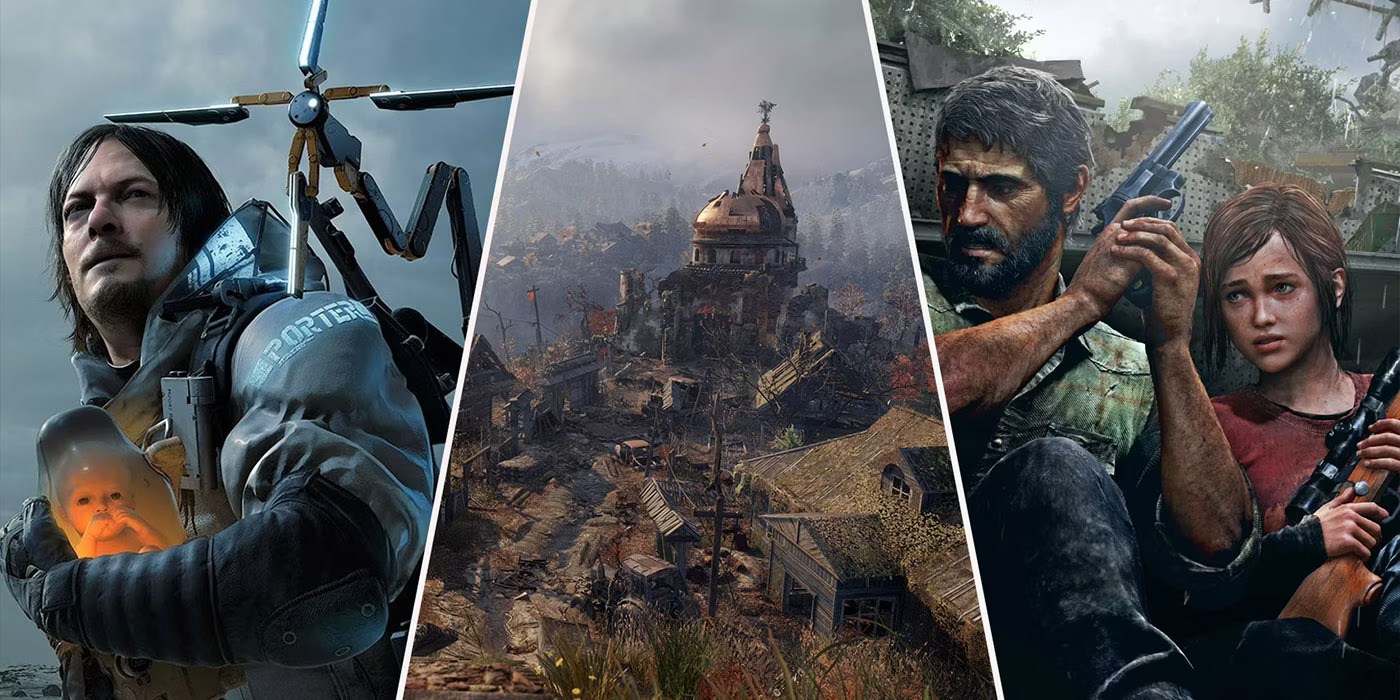Zombie, nuclear, lethal disease, war, and climate catastrophe narratives often have one thing in common: humanity brings destruction upon themselves, the planet, and nature. And if you remember the basic premise of “The Day the Earth Stood Still,” even aliens have to come and rescue the planet from humans. Another common thread is that the apocalypse always fails to kill every single person on Earth. Some people survive to try and rebuild the destroyed world. They are determined to change their old ways and create a new world order where every living creature can live in harmony. Such premises have been used over and over again in post-apocalyptic survival books over the years, but the same story can be told in many different ways, and sometimes there is something new to learn.
The following books are regarded as among the best in the genre, so you should get a glimpse of what it is all about once you’ve finished reading one or two of them.
I Am Legend – Richard Matheson

Robert Neville finds himself in a real precarious situation as he quite possibly is the last man alive. Everyone else has turned into a vampire following an outbreak a year earlier. Some of those vampires used to be people he knew well, including neighbors and a good friend. Luckily for Neville, vampires seem to be dormant during the day and are only actively hunting for prey at night. He uses his time wisely to reinforce the defenses around his house and even prepares some garlic as a preventive measure.
The Stand – Stephen King
A disease escapes from a laboratory and kills 99% of the human population in the United States; the situation is just as bad outside the country, too. Some people turn out to be immune to the disease, but differences in opinions split the survivors into two conflicting factions. When achieving peace is out of the question, a final battle will determine who has the right to decide the fate of the post-apocalyptic world.
Earth Abides – George R. Stewart
A plague wipes out the vast majority of the population. A geographer, who happens to be in the middle of a project in an isolated location, survives the onslaught. When he returns to Oakland, California, no one alive is around, so he travels further to figure out the real extent of the damage. Some other people survive, too, but none really has any desire to team up and rebuild the world with him.
The Drowned World – J. G. Ballard
Europe is practically gone. In its place, there are now jungles and tropical swamps covering the continent in its entirety. Giant reptiles and bamboos are everywhere, as if the wildlife has reverted back to the Triassic age. A survey team is sent to analyze whether it is possible for humans to reclaim at least some parts of Europe someday. Instead of finding hope, they experience regressions of their own.
World War Z – Max Brooks

An oral history of the zombie war, as told by survivors. One CIA agent claims that the zombie outbreak began in China, after which the government conducted a nationwide health & safety sweep program. During the initial phase of the plague, no one really knew that China was executing a crackdown on the undead. Now the outbreak has spread worldwide. England, Japan, and Greece are quickly overrun.
A Boy and His Dog at the End of the World – C. A. Fletcher
An infertility pandemic triggers a rapid decline in the human population. A young boy named Griz is one of just a few thousand people in existence worldwide. Griz loves to play with his dogs, Jess and Jip. One day, a traveler with long hair comes out of nowhere and takes Jess away. Griz doesn’t even think for a second before chasing after the stranger; the loyal Jip follows right behind him. It is during the hunt that the boy and his dog discover the world in ruins and the remnants of both the worst and the best of humanity.
Hollow Kingdom – Kira Jane Buxton
A domesticated crow named S.T. finds its master, Big Jim, lying lifeless. The crow remembers the time when he would spend his days drinking beer, eating junk food, and watching sports on TV, accompanied by Dennis, the family dog. It takes the crow a while to realize that something horrible has happened to humanity. And so, S.T. and Dennis begin a journey to figure out the mystery.
We think the typical narrative point in post-apocalyptic stories revolves around the idea that humans tend to fall into the trap of great hubris, partly due to their relentless pursuit of knowledge and seemingly insatiable thirst for power, but mostly because they are aggressively competitive. The big problem is that they exercise this power, aggression, and ignorance — whether it’s scientific research gone awry, human-caused climate change, or nuclear warfare — at the expense of the planet, ultimately leading to near-total destruction. But then again, humans are resourceful and instinctively capable of rebuilding the planet.
Other things you might want to know:
What is the main similarity between all the post-apocalyptic narratives?
It almost goes without saying that post-apocalyptic fiction relies on the fact that the end of the world is not as bad as everybody thinks it is. The apocalypse does not mean the end of everything but rather presents a new, albeit challenging, opportunity to start over; somebody has to survive to do it.
Is there such a thing as romance in post-apocalyptic novels?
There are actually plenty of them. Among the most popular are:
– Flesh by Kylie Scott
– Last Light by Claire Kent
– Pestilence by Laura Thalassa
– Pride and Prejudice and Zombies by Seth Grahame-Smith
– The Hunger Games by Suzanne Collins
– Warm Bodies by Isaac Marion
What about pandemic-related post-apocalyptic stories?
Our real-world pandemic a few years ago has brought disease-focused post-apocalyptic narratives back to prominence. Some of the most recommended titles include:
– Blindness by José Saramago
– Eternity Road by Jack McDevitt
– The Children of Men by P.D. James
– The Day of the Triffids by John Wyndham
– The Year of the Flood by Margaret Atwood
– Things We Didn’t See Coming by Steven Amsterdam
Check out other articles by month:







